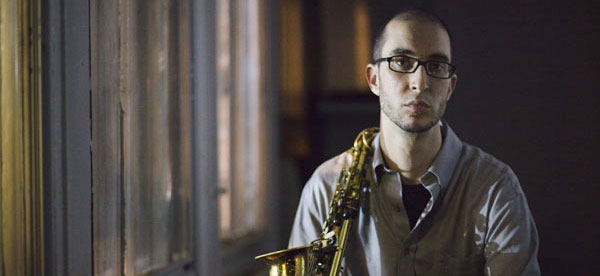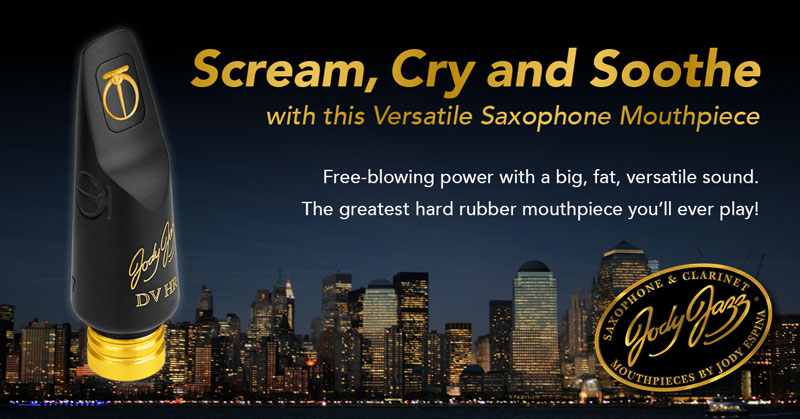Saxophonist Steve Lehman Shows Us What it Takes to Be a True Original
 As a saxophonist, performer, educator, and scholar, New York City’s Steve Lehman has travelled a truly original musical journey. Taking into consideration Lehman’s stints with barrier-busters such as Anthony Braxton, Dave Burrell, Mark Dresser, Vijay Iyer, Oliver Lake, Meshell Ndegeocello, David Wessel, and High Priest of Anti-Pop Consortium, one can see that Steve is anything but your average NYC be-bopper (not that there’s anything wrong with that, of course, but you know what I mean).
As a saxophonist, performer, educator, and scholar, New York City’s Steve Lehman has travelled a truly original musical journey. Taking into consideration Lehman’s stints with barrier-busters such as Anthony Braxton, Dave Burrell, Mark Dresser, Vijay Iyer, Oliver Lake, Meshell Ndegeocello, David Wessel, and High Priest of Anti-Pop Consortium, one can see that Steve is anything but your average NYC be-bopper (not that there’s anything wrong with that, of course, but you know what I mean).
Lehman’s pieces for large orchestra and chamber ensembles have been performed by the International Contemporary Ensemble (ICE), So Percussion, Kammerensemble Neue Musik Berlin, The Jack String Quartet, members of the Argento and Wet Ink Ensembles, and by the pianist Marilyn Nonken.
Behind Lehman’s eclectic mastery is a thirst for knowledge of the world behind the music, as evidenced by his time as a Fulbright scholar studying the reception of African-American experimental composers working in France during the 1970s.
His teaching career has taken him to institutions such as Wesleyan University, the Conservatoire National Supérieur de Musique de Paris, New School University, and Columbia University, The Royal Academy of Music in London, and many more.
Lehman’s recording, Travail, Transformation & Flow, was chosen as the #1 Jazz Album of the year by The New York Times, and his most recent album, Dialect Fluorescent, was released this past April.
The Interview
Doron Orenstein: What was it that inspired you to make music your life?
Steve Lehman: Music has always been a big part of my everyday life. Both my parents were great music lovers and I was fortunate enough to grow up with a piano and a huge record collection in the house. When I was 9, I bought my mother a Charlie Parker cassette as a birthday gift. Hearing that recording was like a bolt of lightening! I got hooked on Charlie Parker’s music and everything else kind of took off from there.
DO: What do you find yourself practicing the most these days?
SL: Most of my practicing is oriented towards new compositions (written by me and/or my peers) that I’m trying to realize at a high level. And I try to write music that will help me to grow, simultaneously, as composer, improviser, and instrumentalist. I spend a fair amount of time trying to polish the extreme (high & low) registers of the alto saxophone and also working to move around the horn very quickly while maintaining very precise articulation. Finally, I continue to devote a good deal of time to becoming more and more comfortable with all of the 1/4 tone fingerings on the saxophone.
DO: What have you been listening to lately?
SL: I’ve been checking out Craig Taborn’s new solo CD on ECM. George Lewis also has a new recording on the Tzadik label which is very special. I studied with Jackie McLean from 1996 to 2002 and I continue to listen to his music all the time. Antipop Consortium also has a new album coming out that I’ve been listening to bits and pieces of in anticipation of the album’s official release.
DO: What would you say is the skill or attribute that’s helped you the most as a musician?
SL: I think just learning to work with all different kinds of people. Learning to trust them. Figuring out how to learn from them. Finding new ways to communicate my own ideas about music. I’m still working on it. But, the better I get at connecting with all of the musicians I work with, the more my music seems to grow and evolve in meaningful ways.
DO: What’s the single best piece of advice you’ve been given over the course of your playing career?
SL: “When I was younger, I thought that music came first. And now that I’ve gotten older, I realize it’s only a reflection of the images of the people I love and being with God.” — Bobby Hutcherson (From his NEA Jazz Masters Profile/Interview)
DO: What’s the next musical frontier for Steve Lehman?
SL: My new trio recording with Damion Reid (Drums) and Matt Brewer (Bass) came out on Pi Recordings in April 2012 so I’m really excited about that and we’ll have a bunch of concerts coming out around the CD release. I’ve also been spending a lot of time developing my work in the area of computer-driven improvisation. I was a researcher-in-residence at IRCAM in Paris during the summer of 2011 and I hope to begin presenting more concerts of my work with interactive human/computer improvisations in 2012.
DO: For those new to your music, which recording would you suggest they pick up?
SL: I think this new trio record, Dialect Fluorescent, could be a good place to start in that it includes a lot of my own compositions as well as a handful of seminal works by composer/performers like John Coltrane, Jackie McLean and Duke Pearson.
DO: What’s your saxophone equipment setup?
SL: I play a Selmer Mark VI saxophone from 1973. I use a Vandoren Jumbo Java mouthpiece and a Vandoren ligature. I play Bari plastic reeds (strength: Hard).






January 19, 2020 @ 8:09 pm
Great stuff from Steve! He has been a deep thinker for a long time. Great player & super nice guy. Proud to know him.
January 23, 2020 @ 8:52 am
another great interview!!